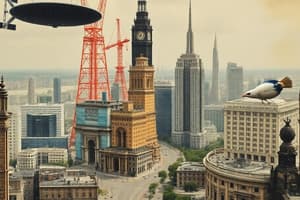Podcast
Questions and Answers
What is the projected population of Mumbai by 2025?
What is the projected population of Mumbai by 2025?
- 16 million
- 18 million
- 10 million
- 14 million (correct)
What is a major challenge facing Mumbai's infrastructure?
What is a major challenge facing Mumbai's infrastructure?
- Rapid population growth
- Inefficient governance
- Traffic congestion and transportation infrastructure (correct)
- All of the above
What is a key demographic change in Mumbai's population?
What is a key demographic change in Mumbai's population?
- Decrease in population growth rate due to declining fertility rates (correct)
- Aging population
- Increase in migration from rural areas
- Increasing population growth rate
What is a key indicator of quality of life in Mumbai?
What is a key indicator of quality of life in Mumbai?
What is a major environmental challenge facing Mumbai?
What is a major environmental challenge facing Mumbai?
What is a strategy for a sustainable Mumbai?
What is a strategy for a sustainable Mumbai?
What percentage of the world's population is expected to live in urban areas by 2050?
What percentage of the world's population is expected to live in urban areas by 2050?
What is the minimum population required for a city to be considered a megacity?
What is the minimum population required for a city to be considered a megacity?
What is a major factor contributing to urbanization?
What is a major factor contributing to urbanization?
What is a characteristic of urban economies that distinguishes them from rural economies?
What is a characteristic of urban economies that distinguishes them from rural economies?
What is the name of the model that describes the spatial growth pattern of cities with different land uses along transportation corridors?
What is the name of the model that describes the spatial growth pattern of cities with different land uses along transportation corridors?
What is the name of the megacity that is a global hub for finance, media, and culture, and has undergone significant changes including post-WWII suburbanization and urban decline, and gentrification and urban renewal?
What is the name of the megacity that is a global hub for finance, media, and culture, and has undergone significant changes including post-WWII suburbanization and urban decline, and gentrification and urban renewal?
Study Notes
A World of Growing Cities
- By 2050, 66% of the world's population is expected to live in urban areas (up from 30% in 1950)
- Cities are hubs for innovation, entrepreneurship, and economic growth, but also face challenges like poverty, inequality, and environmental degradation
The World's Megacities
- A megacity is a city with a population of over 10 million people
- In 2016, there were 31 megacities worldwide; by 2030, this number is expected to increase to 41
- Examples of megacities include Tokyo, Delhi, Shanghai, Mumbai, and New York
Urban Process and Change
- Urbanization is a process of rapid growth and transformation of urban areas
- Factors contributing to urbanization:
- Push factors: poverty, lack of opportunities in rural areas
- Pull factors: better job opportunities, education, healthcare, and infrastructure in cities
- Urbanization can lead to:
- Economic growth and innovation
- Increased poverty, inequality, and social unrest
- Environmental degradation and strain on resources
Urban Economies
- Urban economies differ from rural economies due to:
- Higher population density and diversity
- Greater availability of jobs, services, and amenities
- Increased economic activity and innovation
- Cities are hubs for:
- Service industries (finance, IT, healthcare)
- Manufacturing and logistics
- Tourism and entertainment
The Changing Face of New York
- New York City is a global hub for finance, media, and culture
- Historic changes in New York City:
- Post-WWII suburbanization and urban decline
- 1980s-90s gentrification and urban renewal
- Contemporary growth and development in areas like Hudson Yards and Brooklyn
Land Use in Cities and Spatial Growth
- Urban land use patterns:
- Central business districts (CBDs) with high-rise buildings and commercial activities
- Residential areas with varying densities and housing types
- Green spaces and parks
- Spatial growth patterns:
- Concentric zone model: CBD, residential areas, and suburbs
- Sector model: different land uses along transportation corridors
Mumbai - A Growing Megacity!
- Mumbai is India's financial capital and a global hub for business and entertainment
- Mumbai's challenges:
- Rapid population growth and urbanization
- Overcrowding, poverty, and inequality
- Strain on infrastructure and resources
Mumbai's Changing Population
- Mumbai's population:
- 12 million in 2011, expected to reach 14 million by 2025
- Increasing migration from rural areas and other cities
- Demographic changes:
- Decrease in population growth rate due to declining fertility rates
- Aging population and changing family structures
Quality of Life in Mumbai
- Quality of life indicators:
- Access to education, healthcare, and sanitation
- Air and water quality, noise pollution
- Traffic congestion and transportation infrastructure
- Mumbai's quality of life challenges:
- Poor air and water quality
- Inadequate sanitation and waste management
- Traffic congestion and transportation infrastructure
Challenges Facing Mumbai
- Environmental challenges:
- Rising sea levels and coastal erosion
- Waste management and pollution
- Social challenges:
- Poverty, inequality, and social unrest
- Housing and infrastructure shortage
- Economic challenges:
- Unemployment and lack of job opportunities
- Inefficient governance and corruption
Sustainable Mumbai
- Sustainable development goals:
- Reduce poverty and inequality
- Improve access to education, healthcare, and sanitation
- Increase use of renewable energy and reduce carbon emissions
- Strategies for a sustainable Mumbai:
- Compact and connected urban planning
- Green infrastructure and urban ecology
- Inclusive and participatory governance
Studying That Suits You
Use AI to generate personalized quizzes and flashcards to suit your learning preferences.
Description
Explore the world of growing cities, megacities, and urbanization. Learn about the challenges and opportunities of urban growth, including economic development, environmental sustainability, and social inequality.




